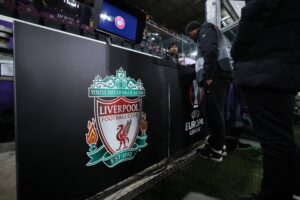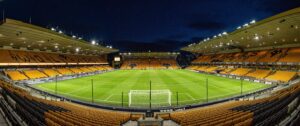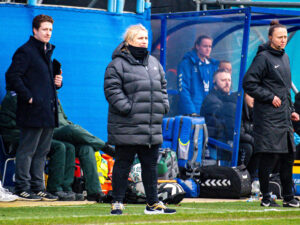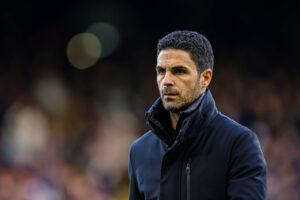As we enter a new year, a season that was shaping up to be the first three-way Premier League title race in well over a decade is under threat of becoming another procession for Manchester City.
There’s a multitude of reasons for this; Covid, injuries, the impending African Cup of Nations and Chelsea’s form falling out of the sky.
But while we wait to see what happens this season, let’s cast our memories back 20 years to the new year of 2002 and inarguably the most finely balanced title race at the halfway point of a Premier League season. Just three points separated the top five sides, with teams taking near-weekly turns at the top.
After a round of New Year’s fixtures, this is how the top five looked on January 2, 2002 – how did they get here, and what happened next?
The Best Premier League Title Race – 20 Years On
Leeds United
Position: 1st Played: 21 Points: 41
Tale of the tape so far:
David O’Leary’s Leeds United had gone top on New Year’s Day with a 3-0 home win over West Ham United and seemingly seemed poised to deliver on their potential as England’s next best young side.
Following on from a run to the Champions League semi-finals the previous season, the Whites had started the season promisingly, with a win at Arsenal and draws away to Manchester United and Liverpool.
The young pretenders had lost only twice by New Year – both to sides from the North-East, with defeat at Sunderland accompanied by a 4-3 deficit to Newcastle United at Elland Road just before Christmas (they had been 3-1 up). These two losses made it just four for the entirety of 2001.
Their success was based on a rock-solid defence, the best in the division at the turn of the year, manned by captain Rio Ferdinand, as well as numerous match-winners upfront, namely Harry Kewell, Mark Viduka, Lee Bowyer and mid-season signing Robbie Fowler.
What Happened Next?
After starting the New Year so brightly, Leeds’ form nosedived almost as soon as they went top, starting off with a FA Cup third-round loss at Division 1 side Cardiff City. This was followed by a stretch of two months without a league win, which left them languishing in sixth place and out of the Premier League title race.
Much of the blame for this collapse is often attributed to the release of O’Leary’s explosive book, crudely named “Leeds United on Trial” which documented the high-profile court case and trial of Lee Bowyer and Jonathan Woodgate in the previous year.
O’Leary was dismissed after a fifth-place finished ensured there would be no Champions League football at Elland Road for a second season running, which led to financial ruin for the club.
Soon-to-be reviled Chairman Peter Ridsdale said they had “lived the dream” but the nightmare was just beginning.
From top of the table on New Year’s Day, 2002 to relegation in May 2004, it would be 16 years before Leeds were back.
Manchester United
Position: 2nd Played: 21 Points: 39
Tale of the tape so far:
The Red Devils found themselves just two points off the top following a 3-1 home win over fellow title-chasers Newcastle on January 2, their sixth win in a row.
This run of form somehow propelled United back into the title race, little over a month after Sir Alex Ferguson had ruled them out of it, such was their dismal start to the season.
Following three titles on the bounce and complete dominance of the Premier League era, United had spectacularly stumbled with six losses in their opening 15 games.
A central factor in this was their leaky defence, with Jaap Stam’s shock departure one game into the new season being keenly felt. His replacement, 35-year old Laurent Blanc, had looked every bit his age thus far.
On a positive note, the attack was purring with fellow new signing Ruud van Nistelrooy well on his way to legendary status at Old Trafford.
What Happened Next?
United’s great form continued with six wins in their next seven, and ten in their next 13, keeping them in the hunt until the final weeks.
Van Nistelrooy captured the PFA Player’s Player of the Year award, in a season where he broke the record for most consecutive Premier League games scored in, with eight – he would eclipse this the following season with ten before Jamie Vardy went one better in 2015.
However, defensive failings would be their downfall as despite being top scorers with 87, 45 goals were let in at the other end. This meant United finished third, their lowest league finish for 11 seasons.
To combat this, Rio Ferdinand was signed from across the Pennines in the summer of 2002, and the Premier League title race was won by the Red Devils the next season.
Fergie also made a U-turn on retirement this year, and remained at Old Trafford for a further 11 years.
Arsenal
Position: 3rd Played: 20 Points: 39
Tale of the tape so far:
Arsenal had a break week in this round of fixtures, finding themselves in third but just two points off with a game in hand and nicely positioned for the run-in.
Bridesmaids for the previous three seasons, the Gunners had made several summer signings, none more shocking than that of Sol Campbell from arch-rivals Tottenham Hotspur on a free transfer.
In addition to this, the likes of Thierry Henry, Patrick Vieira, Robert Pires, and Freddie Ljungberg were coming into their absolute peak. Throw in the emergence of Ashely Cole and the enduring class of Dennis Bergkamp and a perfectly balanced side was being formed.
Home form had let the Gunners down so far, with three losses and two draws from their opening ten games at Highbury. On the flip side, they were unbeaten at home and had won 2-1 away to Liverpool with ten men two days before Christmas – their first win at Anfield in nine years.
What Happened Next?
Arsenal finally shed the bridesmaid tag and landed their first title since 1998, not losing a single league game for the rest of the season and finishing seven clear of their nearest challenger. What made it all the sweeter was winning it at Old Trafford with a 1-0 win.
In doing this, they won 15 and drew three of their last 18 games – going for a perfect 13/13 finish, a league record run of wins at the time. They also scored in every game, a first in English league history.
On top of the league, Arsene Wenger landed the FA Cup, his second league and cup double at the club.
A niche bit of history was also made by Arsenal this season – the first and only time three keepers had made the ten (now five) appearances required for a league medal. David Seaman being joined on the podium by future Manchester City cone setters Richard Wright and Stuart Taylor.
This season marked the beginning of Wenger’s best period at the club, two further FA Cups were won in the next three seasons, as well as a third league title in 2004 with the ‘Invincibles’.
Newcastle United
Position: 4th Played: 21 Points: 39
Tale of the tape so far:
The Magpies found themselves in territory uncharted since the mid-90s as they were firmly in the title race despite a January 2 loss at Old Trafford.
Sir Bobby Robson’s men had been top on Christmas Day, following an excellent start to the season – a far cry from bottom-half finishes in the previous four seasons.
Like Kevin Keegan’s side, they were hugely entertaining – summer signings Laurent Robert and Craig Bellamy adding further class to an established spine of Alan Shearer, Gary Speed, Nolberto Solano and Shay Given.
Standout victories were achieved over several title challengers – 4-3 wins over Manchester United and Leeds, and the cherry on top – a 3-1 win at Arsenal, the Toon Army’s first in four years and 30 attempts in the capital.
What Happened Next?
Robson continually played down his side’s chances of winning the title, but his men were in second place come the end of February.
From here, however, they fell off – losses to Arsenal and Liverpool led to a title challenge becoming a challenge for fourth spot.
This was achieved, meaning Champions League football would return to St. James’ Park for the first time in five years.
This is also marked the beginning of a resurgence on Tyneside, with Shearer continuing to enjoy an Indian summer end to his career and three consecutive top-five finishes secured before Sir Bobby was unceremoniously sacked.
Liverpool
Positon: 5th Played: 21 Points: 38
Tale of the tape so far:
Liverpool’s form had fallen off a cliff coming into the New Year, with just one win in six leading to them falling from first by six points to fifth place in a matter of weeks.
Hope remained high on Merseyside, coming off the back of a cup treble in 2000/01 and with Michael Owen, the 2001 Ballon d’Or Winner, and Steven Gerrard in their pomp.
It had been a traumatic start to the season, with manager Gérard Houllier falling ill during an October home game to Leeds – he would be forced to take a five-month break, with assistant Phil Thompson standing in.
What Happened Next?
Liverpool’s title hopes were near written off by mid-January with two draws and a loss in their following three games.
Then, following a shock late win at Old Trafford (Danny Murphy for the second straight season), the Reds went on a run of 11 wins and one draw in 12, catapulting themselves right back into the title picture.
Significant wins came in the form of a 4-0 hammering of Leeds at Elland Road, a 3-0 demolition of Newcastle at Anfield, as well as a last-minute 1-0 win at home to Chelsea, which had Merseyside dreaming of a first title in 12 years.
Houllier made his emotional return in a Champions League tie against Roma but a loss at Spurs extinguished their title dreams for another season. Still, a second-place finish and 80 points marked their best return in a Premier League season at the time.
This would not be built on, as several mistakes were made in the transfer market, namely signing El Hadji Diouf over loanee Nicolas Anelka. The wait for a title would continue for another 18 long seasons.
Main Photo






